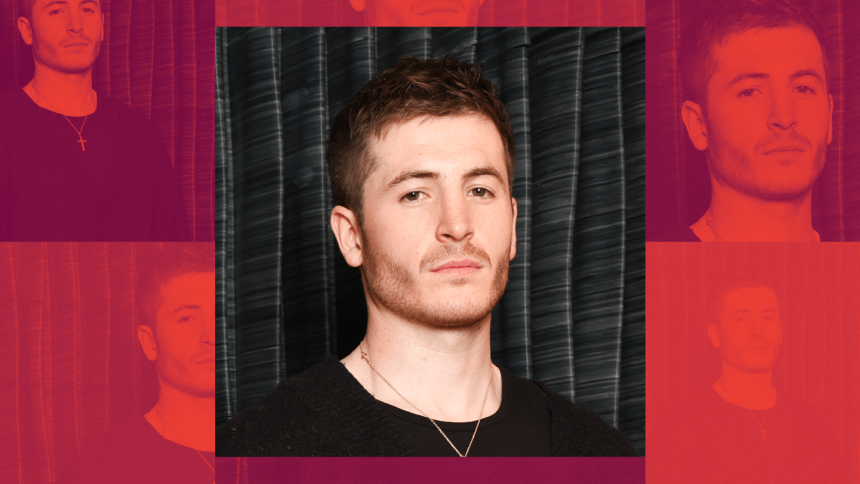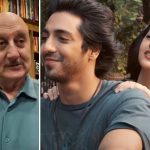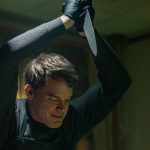Kieron Moore Relishes Taking on Complex Characters, From ‘Code of Silence’ to Queer Camboy
If you don’t know rising British actor Kieron Moore yet from his roles in Vampire Academy, Masters of the Air, The Corps and ITV hit crime series Code of Silence, opposite Rose Ayling-Ellis, you can now catch him in the latter on BritBox in the U.S. and Canada, where it premiered on July 24.
In the show, Moore portrays Liam, a complex and, shall we say, ambiguous character, who meets protagonist Alison (Ayling-Ellis), a determined deaf woman working in a police canteen who gets recruited to use her lip-reading skills in a covert operation. As the story of Code of Silence unfolds, Moore hints at and slowly reveals all sorts of layers to Liam.
The 28-year-old from Manchester didn’t have a chemistry test with Ayling-Ellis, but playing multi-layered characters seems natural to him. After all, he is not only enjoying the challenges of acting, but also used to be a boxer and writes poetry, among other interests.
Next up, fans can see him as queer fetish camboy Aaron in Elliot Tuttle’s drama Blue Film, in which he stars opposite Reed Birney, which has been selected for the competition program of this year’s 78th edition of the Edinburgh International Film Festival, which unspools next month.
You Might Also Like
Below, Moore chats with The Hollywood Reporter via Zoom about his varied interests and how they help him when it comes to acting, Code of Silence, which has been renewed for season two, Blue Film, his experience on Sex Education and why he enjoys continuously challenging himself.
Your Code of Silence character, Liam, is difficult to get a handle on early. Can you talk a bit about how you developed this role, which is your first leading part on TV?
There are levels to him. The first thing is you must trust in yourself. You have to have an opinion. As limited as I am in my acting experience, I have to know that character more than all of you. Lead director Diarmuid Goggins (Kin, Black Cab) and I got along like a house on fire. We had great chemistry, just because I trusted him. He was looking out for my character, but he also appreciated when I was saying to him: “You have a million pots on the stove right now, while I only have one, and that is Liam. I spend more time with him, so you have to trust me.”
Something a friend said to me one time has also always stuck with me: You can’t be everything in every character; you’ll get opportunities to show different things.
So who is Liam? Liam is intelligent but has a difficult past, and when you’ve got his level of intelligence, you kind of outthink yourself sometimes. That was constantly on my mind with him. It’s like a mask. He puts up all these walls with the gang he works with. But then with Rose’s character, Alison, he just lets them crumble a little bit somehow.
So you can relate to Liam or recognize some of his characteristics?
I think with Liam, it was quite easy to get into this mode of lying to everyone. In my personal life, it’s always a bit of a struggle coming back home to Manchester, because I love my family, but there’s a certain routine. It’s not so much that they stay the same, but that I’ve changed. So, there’s that thing of being what people expect you to be and want you to be.
And I have a dad who is the most unreadable person in the world, but you feel him, and I felt him as a kid. My mother is the opposite — she wears everything on her face.
With Liam, more than anyone that I’ve played so far, I was naturally bringing in this self-awareness. And he puts on this kind of mask. But once you get to episodes five and six, hopefully you get to understand that he’s burdened, and you may find yourself being upset with him about some things but also rooting or hoping for him.
How do you think about viewers’ role in making sense of Liam?
I guess with every character you play, when you truly feel that you know who they are, you realize that everyone struggles to understand who they are, and that gives all of us an opportunity to learn something about ourselves.
I write poetry. That has always been my thing. I love poetry. I would usually write a poem and keep it to myself. But family members or others have stumbled upon my poems or I’ve shared poetry with my friends, and they often go: “Oh, you must have meant this!” And I actually didn’t, but I’m so glad that you found something else in it.
You have developed a reputation for playing complex characters. And you have different sides to you as a person too. You just mentioned poetry, and I heard you also used to be a boxer?
How nice to be a contradiction! [Laughs] Boxing is my first love. My dad’s Kieron Moore. I’m Kieron Moore Jr. My dad always wanted to be a boxer, but his mum and dad said no. One day, my mum let me take out a videotape to watch on VHS. We had them under the TV. She was thinking I’d pick Tarzan or something, but I saw my name on one tape and said I want to watch that. Mum’s like: No, no, no, no. But she puts it on. And it’s my dad in his first boxing fight. He only had three.
So, I’m five years old and want to be a boxer. I was in a gym at five years old, and I trained three, four times a week up until I was 10. And I got good. It was illegal to box in England until you were 11 at the time. My dad’s side of the family is Irish. My mum’s side is Welsh. And in Wales, you can box at 10. So we used my grandmother’s address in Wales, and I started competing when I was 10 years old. I had six fights, and then I turned 11. But I boxed up until I was 21 because everyone told me I was going to be a boxer. My Dad was my coach. I guess I was good at it. But when you’re good at something and it comes naturally, you get complacent. I was also extremely nervous. I never believed anyone when they told me I was good at boxing. I thought maybe they just told me I was good.
I had 60, 70 fights, and I traveled too. But when I was 21, I just knew I had to make a choice. I knew I didn’t love it enough. And it’s a dangerous sport if you don’t love it. I just didn’t want to be a journeyman. And at 21, when you decide to quit something, what do you do? I thought, let me go into acting.
People may think boxing and poetry are a contradiction. I started writing poems very early. I wrote a poem for my grandma’s funeral when I was 10, which I couldn’t even attend because I was at a boxing camp. But the pastor read it for everyone. And my mum and dad came back and said: “Everyone loved your poem. People were crying.” I just remember thinking: “Wow, words affect people.” I think words are so powerful. I love what poetry can do.
Could we see you publishing any of your poetry or writing a script?
I’m actually writing a script about a bad injury I had at the start of my boxing career. I’ll talk about this more when it’s time. And yes, I’m typing my poems up.
The title that I’m working on for my poetry book is called The Burden of Caring. The positives and negatives of caring are quite burdenous, but in the most beautiful way. If you watch someone in your favorite roles, and if you care about them, they burden you while you watch.
If you’re anxious and scream, “Oh my God, please don’t get hurt!” Or you watch Rose in Code of Silence and go: “Oh my God, stop doing that, because I care about you!”
Did you ever face frustrations in your move into acting?
When I was learning acting, I did a scene with my friend, and I was really frustrated, and when everyone left, I sat down and festered in class for 10 minutes. My coach asked me what was wrong. I said I keep waiting for someone to do something special so that I can respond and be special. And he said: “Why don’t you just do that for them?” And it turns out that it’s so much more interesting when you realize it is all about giving.
That’s where chemistry comes in. With Rose, I would throw her a softball, and she would knock it out of the park. And that comes with trust and being open. And I kind of hope that I do the same for everyone else. I’m desperate for opportunities for them to let me find something else in their characters and in my character that we don’t know yet. The most refreshing part about the Liam experience has been hearing people notice the subtleties that I am trying to bring to the role. I can be expressive, but I think real people live with and in their little quirks.
What can you tell me about Blue Film, which will world premiere at Edinburgh?
It’s from a first-time film director, Elliot Tuttle, and produced by the likes of Adam Kersh, who represents Sean Baker, and also Mark Duplass. All that is really cool. It’s a very provocative movie and a very daring role for me, but I wanted to show I’m fearless.
Basically, I play a gay American camboy who spends the night with a stranger for $50,000, and when he gets there, the stranger is wearing a ski mask and has a camcorder set up and starts asking him questions. But the questions get deeply personal, and then there’s an altercation and a reveal. I don’t want to give away too much. It’s a conversation between these two people exploring shame and sexuality and identity and a little bit of religion and the question if we’re born the way we are.
It’s a two-hander with Reed Birney, who’s done quite a lot of Broadway stuff. It’s my first movie, which was really exciting.
This sounds like a role that is a real challenge and pushes one outside one’s comfort zone.How did you get cast?
The Hollywood strike happened, and I was filming the Netflix show [Boots], which was stopped, and I stayed in New Orleans. And when the strike finished, Netflix decided to do some rewrites, which delayed things. I thought: “Wow, I’m very unemployed right now.” And then Saltburn had just come out, and I thought: “What a role for an actor!” I briefly met Barry Keoghan once and have been enamored by him, because he is a very interesting actor, and a lot of my friends know that I like his work. That role would have been so good for you, they said. And he does it so well.
So, I said if anything dangerous comes up, I want that chance. Five days later, my manager texted me and said, “Check your emails!” He said that most people would say no to this role, but I might like it. And then I got the script. When I read it the first time, I was like whoa! And I read it again. And I felt I have to do this. When I did an audition, they said: “We really like what you did, but we’re going to go somewhere else.” And Reed, who’s now one of my very good friends, was like: “I’m not doing the movie unless it’s with Kieron.” He got me the job really.
I think contradictions are really exciting. And this is a movie where power is massively involved. I’m much bigger than Reed, and I’m physically capable, which just added a really interesting dynamic. Hopefully, people will appreciate the art. It’s definitely a dangerous and brave film. At the end of the day, all I want to do is look back and be like: “Wow, the roles I have played were all so different.”
How do you think about your future as an actor?
There’s a letter that I wrote to myself when I was doing Vampire Academy that I just completely forgot about. And it was just so interesting to have it now, and I’ve been speaking about it with my friends. When you’ve worked hard at something, you kind of naturally, subconsciously become very defensive of it. In this letter that I wrote to myself, I said: “It’s really sad that I’ve gotten to where I thought I wanted to be, and I realized that I have to leave behind the Kieron that got me here.”
You think you have made all these changes, so you are ready. But you get as far as you do, and you have to change again. That’s the thing: you constantly have to be changing. And that’s something that I’m starting to get more comfortable with now. I know that I don’t have all the answers. Everything has led me to this, but then that next door will hopefully open, people will want to work with me, and I’ll have to find that version of me for that. That’s terrifying, but also so exciting.
There’s a line in one of the Night at the Museum films. Ben Stiller goes: “I don’t know what I’m gonna do tomorrow.” And then Robin Williams goes: “How exciting…”
Since you are quoting films, I just noticed that you are wearing a Goodfellas T-shirt. Are you a big fan?
I just love that scene where Robert De Niro is at the bar, and then “Sunshine of Your Love” by Cream kicks in. It’s one of my favorite songs. I love that part in the script. It demonstrates that you don’t have to say anything to do something [as an actor].
It’s not necessarily about stealing moments, but being alive in moments when the script isn’t centered around your character. I’ve worked to hone my craft so that I’m not lazy because no one’s ever just doing nothing. So, I think about that moment in Goodfellas all the time, when De Niro smokes that cigarette and his eyebrow flickers and he’s just telling us, “I’m gonna kill you.”
You had a small part in Sex Education as Dylan, too. How was that?
That was actually one of my first experiences ever. I did two days on that show, and Connor Swindells was so nice to me. Yeah, it was a great experience. It was beautiful and really insightful.
I saw that you have more Netflix stuff coming up?
Yes, I have done a show for Netflix that comes out in the fall. It’s called Boots. It’s based on a book called The Pink Marine by Greg Cope White about a guy who joins the Marines when you still couldn’t be gay in the military.
I’m not playing a very nice character. His name is Slovacek. He is an ex-con who joins the Marines and is an antagonist who goes on a journey though. I like that because I think everyone has a vulnerability. Again, he’s very different from Liam and Aaron. Those three characters would hate each other. So I’m excited that I have a couple of things coming out this year, which I hope will show that I can do different things.
Any tips for actors who are even younger than you on developing characters?
The most interesting parts of every character I’ve played, the most interesting parts of their lives, are off camera. Liam has these great moments in Code of Silence, don’t get me wrong! He has some fantastic moments. But I do genuinely think the most interesting parts of Liam’s day are when he goes home. And as an actor, I think about what he does and feels in those moments we don’t see on camera. Who is he then?







